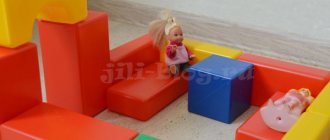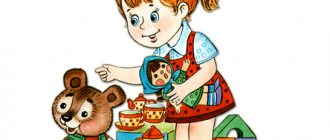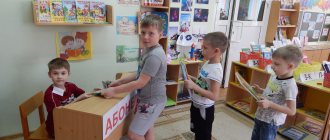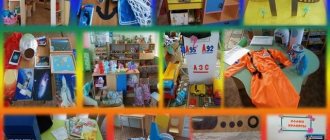How are role-playing games beneficial for a child’s development?
The benefits of such activities are varied. They are as follows:
- creating communicative and speech experience;
- enable the child to act in conditions reminiscent of real situations;
- opening up the chance for exploration and experimentation;
- help to gain social skills from communicating with children and adults;
- by trying on an unusual role, the baby will better understand those around him;
- promote knowledge of different cultures, expression of thoughts and feelings in the most friendly atmosphere;
- provide an opportunity to learn better through entertainment;
- stimulate imagination and creative skills.
Role-playing games are one of the effective language learning techniques. During the course, the baby copies the phrases he hears and can also form his own sentences. This technique promotes the development of vocabulary and experience of communicating with other people.
Article:
In the life of a preschool child, play occupies one of the leading places.
For him, play is the main activity, a form of organizing children’s lives, and a means of comprehensive development. The urgency of the problem is that children come to kindergarten with low social competence, inadequate orientation of the child in social relationships in the family or in the child’s relationships with peers. Therefore, social relationships should become the subject of special preparation of the child for adult life. The optimal form of this relationship is role-playing game. Hence the importance and relevance of considering the theory of game application. We must teach the child to live by common interests, obey the demands of the majority, and show kindness to peers. My observations of children helped me outline specific ways to work with each child. I set myself the following tasks: to teach a child to play, to help unite children in play; tactfully guide the choice of game, teach children to follow the rules during the game, cultivate a sense of goodwill and mutual assistance. Work on the development of role-playing games was carried out in the following directions:
1.Creation of the necessary developing subject-spatial environment.
2. Direct supervision of children's games.
My task as a teacher is to make the game interesting and meaningful, so that in the process children learn to experience sublime, noble feelings, learn to dream and fantasize.
This can be achieved by opening up to children the world of kind, selfless actions of people. Positive emotions, impressions, knowledge – this is the basis of meaningful games!
With the help of parents, we equipped a developing subject-spatial environment. We made durable, comfortable doll furniture, made attributes, sewed costumes for acting, sewed and knitted clothes for the dolls.
Positive results in work can be achieved only by working in close contact with parents. I advised fathers and mothers what toys their children should buy. Conducted a parent meeting on the topic “The Importance of Play in a Child’s Life,” set up a stand “Plot-role play in a child’s life,” and prepared moving folders.
The requirements for a developing subject-spatial environment according to the Federal State Educational Standard are the creation of a favorable social situation for the development of each child in accordance with his age and individual characteristics and inclinations.
The content of the Program should cover the following educational areas:
- social and communicative development;
- cognitive development;
- speech development;
- artistic and aesthetic development;
- physical development.
The developing subject-spatial environment of the group must be content-rich, transformable, multifunctional, variable, accessible and safe.
The richness of the environment must correspond to the age capabilities of the children and the content of the Program.
1) Transformability of space implies the possibility of changes in the subject-spatial environment depending on the educational situation, including the changing interests and capabilities of children.
2) The multifunctionality of materials implies the possibility of varied use of various components of the object environment, for example, children's furniture, mats, soft modules, screens, etc.;
3) Variability of the environment presupposes the presence in the group of various spaces (for play, construction, privacy, etc.), as well as a variety of materials, games, toys and equipment, ensuring the free choice of children; periodic change of play material, the emergence of new objects that stimulate the play, motor, cognitive and research activity of children.
4) Accessibility of the environment presupposes free access for pupils to games, toys, materials, and aids that provide all basic types of children's activities.
5) The safety of the subject-spatial environment presupposes the compliance of all its elements with the requirements for ensuring the reliability and safety of their use.
Our life is changing, due to new conditions, there is a need to organize more modern games, which I want to offer you:
Travel agency
Objectives: To introduce children to professions - director of a travel company, tourism manager, courier, cashier, tourist, etc. Learn to change game interaction depending on changes in the plot plan. Develop fantasy and imagination. Develop positive communication skills and an active life position.
Approximate game actions: vouchers, tickets, help with advice; booking railway and air tickets, hotels, cruises, cars for rent; meals, excursions, entertainment; distribution of promotional literature; preparation of travel documentation; advising clients on various issues: climate, customs, visa requirements, etc.
Subject-game environment. Equipment: photographs; souvenirs; city maps; vouchers; tickets.
Bank
Goals: Choose a role and act in accordance with it, develop cooperation skills. Reflect the phenomena of social reality in the game, reinforce the rules of behavior in public places, and develop speech etiquette skills.
Approximate game actions: visiting a bank, selecting the necessary services; operating a cash desk, a currency exchange office; paperwork, accepting utility payments; working with plastic cards; consultations with the bank director.
Subject-game environment. Equipment: forms; cash register; savings books; computer; plastic cards; money from different countries; machine for working with plastic cards.
Hypermarket Essen
Goals: to teach children to coordinate their own game plans with the plans of their peers, to change roles during the game. Encourage children to more widely use knowledge about the life around them in games; develop dialogical speech.
Approximate game actions: coming to the supermarket; purchasing necessary goods;
management consultations ; sales announcements; payment for purchases; product packaging;
resolving conflict situations with the director or administrator of the supermarket.
Subject-game environment. Equipment : cash register; sets of products (vegetables, fruits, waste materials); overalls for sellers, cashiers, managers; souvenirs; checks, bags, wallets, money; sets of small toys; magazines, newspapers; clothes, shoes, hats, etc.; account books, price tags, indexes, names of departments; telephones, walkie-talkies, microphones; packaging, food carts.
They are showing new TV shows and again the idea arose to organize new story-based games with the children, such as “Television”.
A television
Goals: To consolidate the role actions of television workers, to show that their work is collective, and the result of the entire team depends on the quality of the work of one. To consolidate children’s ideas about the media and the role of television in people’s lives.
Exemplary game actions: choosing a program, compiling a program by editors;
compiling texts for news and other programs; preparing presenters and spectators; studio design; work of lighting and sound engineers; showing the program.
Subject-game environment. Equipment: computers; walkie-talkies; microphones; cameras; firecracker; programs (texts); symbols of various programs; costume elements; makeup; cosmetic sets; interior elements, decorations; scripts, photographs.
Model agency
Goals: to teach children to assign roles and act in accordance with them, to learn to model role-playing dialogue, to cultivate a friendly attitude towards each other, to determine the characters of the characters, to evaluate their actions. Display the phenomena of social life in the game.
Approximate game actions: admission to a modeling agency; training: stage speech, stage movement, etc.; selection of models for display; work with fashion designers; working with photographers; drawing up a “portfolio”; fashion show.
Subject-game environment. Equipment: camera; scenery; cosmetic sets.
Editorial
Goals: To consolidate the role actions of editorial staff, to show that their work is collective, and the result of the entire team depends on the quality of the work of one. To consolidate children's knowledge about the media, about the role of newspapers and magazines in our lives. Develop children's speech.
Exemplary game actions: editorial board; making a newspaper or magazine layout; distributing tasks and completing them; taking photographs, writing articles;
using drawings, coming up with headlines; compiling a newspaper (magazine).
Subject-game environment. Equipment: cameras; magazine layouts; notebooks;
photographs; film; typewriter; computer; drawings.
Beeline Corporation, MTS, Megafon
Goals: to teach children to independently assign roles and act according to the role they have assumed. Reflect the phenomena of social reality in the game, reinforce the rules of behavior in public places, corporate ethics, develop speech etiquette skills, learn to join in group work and independently find attractive moments in it, learn to evaluate the quality of a task, and develop cooperation skills.
Approximate game actions: the work of telecom operators; the work of sales managers for telephones and other means of communication; a repair shop; payment for services; help desk.
Subject-game environment. Equipment: cell phones; computers; invoice forms; checks; items and packages with Beeline symbols; badges for employees; advertising brochures, magazines.
Design studio
Objectives: Learn to independently assign roles and act according to the role, develop the skill of speech etiquette, learn to join in group work and independently find attractive moments in it, learn to evaluate the quality of a task (your own work and your play partners), learn to express your opinion publicly; consolidate children's knowledge about the life around them, continue to introduce them to the employees of the design studio.
Approximate game actions: choosing an object, accepting an order; layout competition; selection of materials, measurement of the area of work; coordination with the customer; interior design, delivery of the order; addition of decorative details; resolution in case of conflict or controversial situations; payment for the order.
Subject-game environment. Equipment: albums for interior decoration; samples of fabrics, wallpaper, paint, etc.; layout of various rooms; decorative ornaments; flannelgraph with a set of pictures of furniture and decorative ornaments; centimeter; roulette; albums with lamp samples; albums on floristry.
In a collective game there are usually organizers, thanks to whom the children’s plans are realized. The children choose the organizers themselves. To impart knowledge to children about the work of adults, I conducted excursions to Ak Bars Bank, a travel agency, etc. The children observed: the work of adults. I drew their attention not only to the external side of the work of adults, I explained how adults approach their work, how their work is organized.
In conclusion, I would like to say that role-playing games will definitely come into the lives of our children. But how rich and varied it will be, and how many complex life conflicts children will overcome while playing, largely depends on us, teachers. Do not forget that role-playing games are a very powerful means of successful socialization and mastering the skills of solving the most unforeseen situations. It is not without reason that the best managers in the world resort in their work to an analogue of a children’s role-playing game, which they call “business” in an adult way.
Bibliography:
1. Vygotsky L.S. Questions of child psychology. - St. Petersburg: Union, 2004.
2. Elkonin D.B. Psychology of the game. - M: Vlados, 1999.
3. Mironova R.M. Game in the development of children's activity. - Minsk: Narodnaya Asveta, 1989.
4. Role-playing games for preschoolers. / Boychenko N.A., Grigorenko P.I., Kovalenko E.I., Shcherbakova E.I. - Kyiv: Rad.Shkola, 1982.
5. Krasnoshchekova N.V. Role-playing games for preschool children. - Rostov n/d: Phoenix, 2008.
Bibliography.
6.V.V.Zenkovsky. Psychology of childhood. Ekaterinburg, Business book, 1995.




